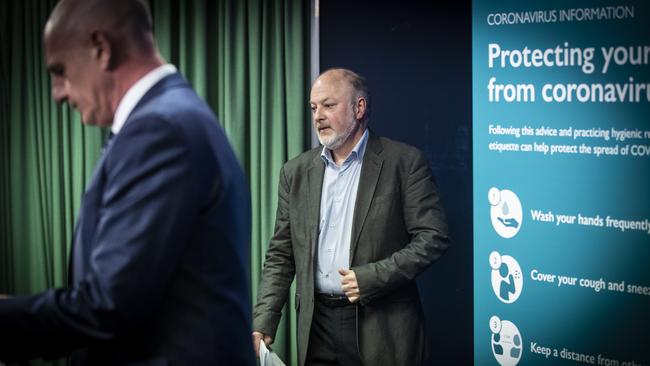Risk management expert, microbiologist says Gutwein and Public Health have it all wrong
Premier Peter Gutwein has absolved himself of any “science-based” decision by putting up Public Health as his scapegoat, says microbiologist and risk management expert JOHN SUMNER
Opinion
Don't miss out on the headlines from Opinion. Followed categories will be added to My News.
OUR Premier has closed our border virtually indefinitely for reasons which have nothing to do with science and risk assessment.
Risk analysis became a useful tool in the mid-1990s and the UN World Health Organisation (WHO) and Food and Agriculture Organisation (FAO) pooled their knowledge to develop principles and guidelines for doing the job.
It’s the tool of choice for those of us in the risk business, sadly not for our Premier and his Public Health staff.
Dealing with risk requires three groups: a risk manager (our Premier) who instructs risk assessors to provide answers to the risk questions he needs assessed, plus risk communicators who keep us all abreast of the manager’s decisions.
The iron rule is that assessors must be independent of the risk manager, which is our first no-no, and the reason is obvious: Our Premier is all over the media saying the health of Tasmanians is his only priority.

So it would be crazy brave for a government employee to offer independent advice that
conflicts with our Premier’s mindset and current “risk assessments” appear tailored to support his public position.
And that’s the second no-no, DHHS acts as the de facto risk manager, providing the Premier with excellent cover and absolving him from a science-based decision.
Let’s be clear what makes a risk assessment – it’s in two parts: the likelihood of a person becoming contaminated with the hazard (COVID-19), plus the severity the hazard will have if they do become contaminated.
The severity of COVID-19 illness varies from no symptoms to mild illness, to serious illness and to death, particularly in the aged and those with comorbidities.
In terms of likelihood of contamination each State and Territory has a database with up-to-date
results on prevalence – how many are carrying the virus.
For example, when Victoria started its lock down the prevalence of positive tests was 2-3 per cent meaning that among the 2 million who live in Western Melbourne there were 40000-60000 carriers.
The same day NSW had 12 isolations from 30,000 tests (0.04 per cent prevalence) meaning that in Western Sydney there were around 800 carriers.
In SA, WA, QLD and Tasmania detections in the community were below the level of detection for many days on end.
So, if our Premier asked an independent risk assessment panel: “What’s the risk of a carrier coming in from interstate” that could be quickly estimated by mining the data from each jurisdiction. The panel would quickly exclude Melbourne, Sydney and other hot spots.
For WA, SA, QLD and NT the advice would be: “Their carrier rate is similar to our own, so the likelihood of importing a carrier is tiny.”
Further advice would be: “And the risk becomes significant only if that carrier meets a vulnerable person is a close setting. But we have all their contact details and can check them in the first few days”.
Our Premier could then make a risk-based decision and join his NSW counterpart as the only Premier sufficiently brave to take a science-based approach.
In communicating risk management decisions the UN guidelines and principles tell us the bleedingly obvious: be upfront and let the data speak – people will appreciate knowing the truth, even if it’s hard to take.
Communication Premier-style is the direct opposite – long drawn-out, stylised, highly managed and data-free (except for what’s we’ve already read in the papers on cases and deaths).
Of course risk management of older Tasmanians, of whom I am one (in spades) is a priority but I’d be more confident what we were told were science-based, not based on opinion polls, focus groups and talkback radio.
Dr John Sumner is a microbiologist who specialises in hazard management and risk assessment in food systems and has advised most Australian governments, the United Nations FAO and WHO and food companies. He is an Adjunct Senior Researcher with the University of Tasmania’s Tasmanian Institute of Agriculture. These views are his own.


